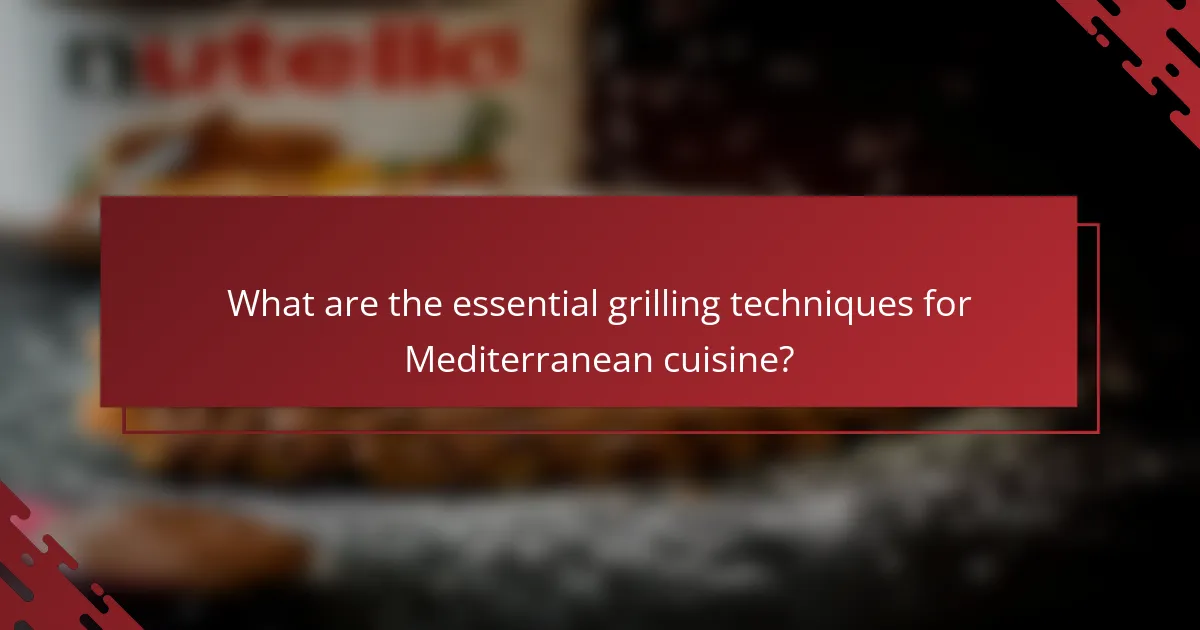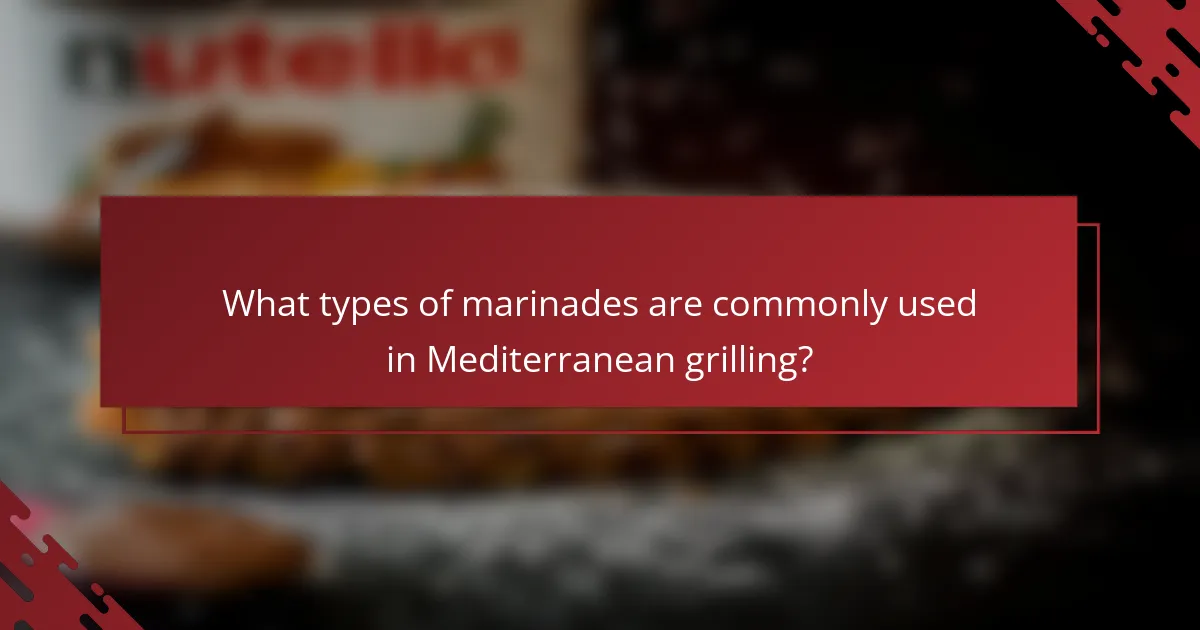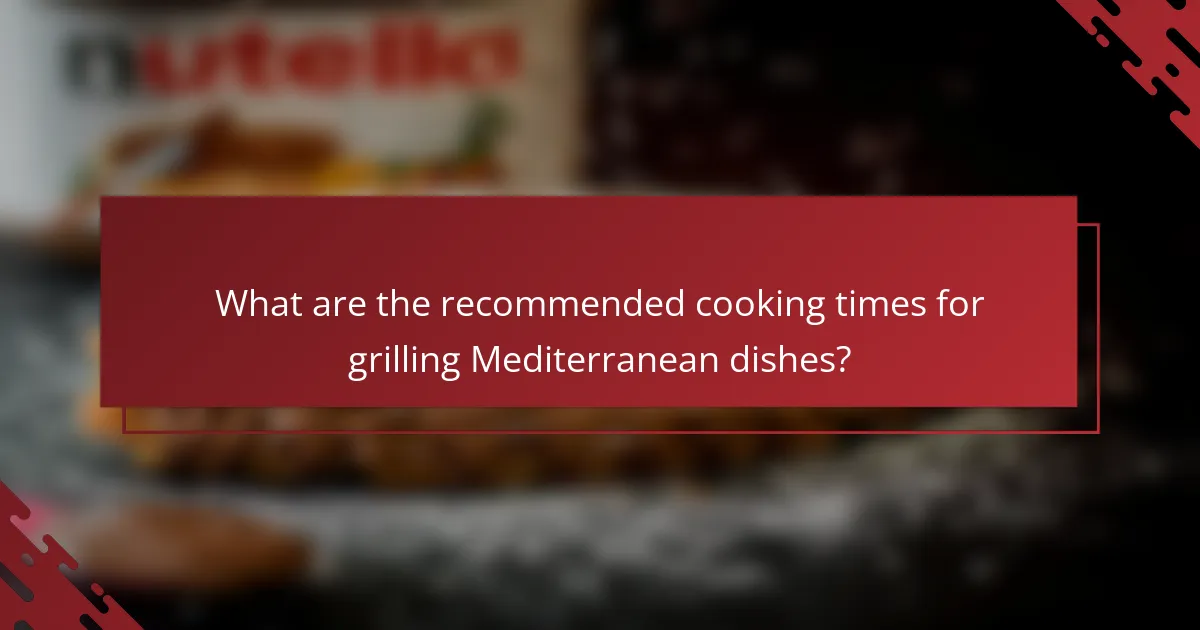Grilling techniques for Mediterranean cuisine encompass methods such as direct grilling, indirect grilling, and marinating. Direct grilling is ideal for skewered meats and vegetables, while indirect grilling suits larger cuts of meat. Marinades, including olive oil, lemon juice, garlic, and herbs, are essential for enhancing flavor and tenderness. Specific cooking times for various proteins and vegetables ensure optimal results, with chicken skewers requiring 10-15 minutes and lamb chops needing 4-6 minutes per side. This overview provides a foundation for mastering Mediterranean grilling techniques and achieving flavorful dishes.

What are the essential grilling techniques for Mediterranean cuisine?
Essential grilling techniques for Mediterranean cuisine include direct grilling, indirect grilling, and marinating. Direct grilling involves cooking food over high heat. This method is ideal for skewered meats and vegetables. Indirect grilling uses lower heat and is suitable for larger cuts of meat. Marinating enhances flavor and tenderness. Common marinades include olive oil, lemon juice, garlic, and herbs. These ingredients are staples in Mediterranean cooking. Utilizing these techniques results in well-cooked, flavorful dishes. Grilling at the right temperatures ensures optimal results.
How do grilling techniques vary across Mediterranean countries?
Grilling techniques vary significantly across Mediterranean countries. In Greece, grilling often involves marinating meats in olive oil, lemon, and herbs before cooking on charcoal. Turkey uses a technique called “kebap,” where skewered meats are grilled over open flames, often seasoned with spices like sumac. In Italy, grilling is typically done using a method known as “alla griglia,” focusing on fresh ingredients and simple seasoning, often accompanied by vegetables. Spain features “asado,” where meats are grilled slowly over wood or charcoal, enhancing their flavor. Each country incorporates unique marinades and cooking times, reflecting local ingredients and culinary traditions. For example, Greek souvlaki cooks quickly, while Spanish ribs may take longer to achieve tenderness. These variations highlight the regional diversity within Mediterranean grilling practices.
What traditional grilling methods are used in Greece?
Traditional grilling methods used in Greece include souvlaki, which involves skewering marinated meat and grilling it over an open flame. Another method is the use of a charcoal grill, known as a “brazier,” for cooking various meats and vegetables. The technique of “kleftiko” involves slow-cooking marinated lamb in a sealed container with herbs, often buried in hot coals. Additionally, “souvla” is a method where large pieces of meat are grilled on a vertical spit. These methods reflect Greece’s rich culinary heritage and emphasize the use of fresh ingredients and traditional flavors.
How does Italian grilling differ from Spanish grilling techniques?
Italian grilling typically emphasizes the use of olive oil, herbs, and simple marinades, while Spanish grilling often incorporates bold spices and diverse ingredients. Italian techniques focus on grilling meats and vegetables over direct heat, enhancing their natural flavors. In contrast, Spanish grilling may include the use of marinades with ingredients like smoked paprika and garlic, adding depth to the flavor profile.
Additionally, Italian grilling often features traditional dishes like bruschetta and grilled fish, showcasing regional ingredients. Spanish grilling highlights items such as chorizo and seafood, reflecting the country’s coastal influences. These distinctions illustrate the cultural differences in flavor preferences and ingredient usage between the two Mediterranean cuisines.
Why is understanding grilling techniques important for Mediterranean dishes?
Understanding grilling techniques is crucial for Mediterranean dishes because it enhances flavor and texture. Proper grilling allows for the development of char and smokiness, which are key characteristics of Mediterranean cuisine. Techniques such as direct and indirect grilling can influence cooking times and the doneness of meats and vegetables. For example, marinated meats benefit from high-heat grilling to achieve a caramelized crust while retaining moisture. Additionally, different grilling methods can affect the nutritional profile of dishes, preserving healthy ingredients. Mastery of these techniques ensures authentic preparation, reflecting the culinary traditions of the Mediterranean region.
How do grilling techniques affect the flavors of Mediterranean cuisine?
Grilling techniques significantly enhance the flavors of Mediterranean cuisine. Charcoal grilling imparts a smoky flavor that complements herbs and spices commonly used in Mediterranean dishes. Direct heat from grilling caramelizes the natural sugars in vegetables and meats, creating a rich, savory crust. Techniques like marinating before grilling infuse ingredients with additional flavors, often using olive oil, lemon, and garlic. The high temperatures of grilling lock in moisture, resulting in tender and juicy meats. Cooking times vary, affecting the level of charring and flavor depth. For example, quick grilling of seafood retains its delicate taste while longer grilling of meats develops a robust flavor profile. Overall, the combination of grilling methods and traditional Mediterranean ingredients creates a unique and vibrant culinary experience.
What role does grilling play in Mediterranean culture and dining?
Grilling is a fundamental aspect of Mediterranean culture and dining. It serves as a communal cooking method that brings people together. In Mediterranean regions, grilling is often associated with outdoor gatherings and celebrations. Traditional ingredients like seafood, vegetables, and meats are frequently grilled, enhancing their natural flavors. Grilling methods vary across countries, reflecting local customs and preferences. For instance, Greece emphasizes souvlaki, while Spain features grilled seafood. The Mediterranean diet promotes health, with grilled foods being lower in fat. This cooking technique also fosters a connection to the land, as many Mediterranean communities prioritize local and seasonal ingredients.

What types of marinades are commonly used in Mediterranean grilling?
Common marinades used in Mediterranean grilling include olive oil-based mixtures, yogurt marinades, and herb-infused blends. Olive oil marinades often combine lemon juice, garlic, and herbs like oregano or thyme. Yogurt marinades typically feature spices such as cumin and coriander, providing a tenderizing effect on meats. Herb-infused blends can include fresh parsley, basil, and mint, enhancing flavor profiles. These marinades are essential for adding moisture and depth to grilled dishes. They are widely recognized in Mediterranean cuisine for their ability to complement various proteins and vegetables.
How do different marinades enhance the grilling process?
Different marinades enhance the grilling process by adding flavor, moisture, and tenderness to the food. Marinades typically contain acidic components like vinegar or citrus juice. These acids break down proteins, making meats more tender. Additionally, marinades often include oil, which helps to keep the food moist during grilling. Herbs and spices in marinades infuse the food with complex flavors.
Research shows that marinated meats can retain moisture better than unmarinated ones. A study published in the Journal of Food Science found that marinated chicken retained 10% more moisture during cooking. This moisture retention prevents drying out on the grill. Therefore, using different marinades can significantly improve the overall taste and texture of grilled dishes.
What are the key ingredients in a traditional Mediterranean marinade?
A traditional Mediterranean marinade typically includes olive oil, lemon juice, garlic, and herbs. Olive oil serves as the base, providing richness and flavor. Lemon juice adds acidity, enhancing the overall taste. Garlic contributes a robust aroma and depth. Common herbs used are oregano, thyme, and rosemary. These ingredients are fundamental in Mediterranean cooking, reflecting the region’s culinary traditions.
How does marinating time influence the flavor of grilled dishes?
Marinating time significantly influences the flavor of grilled dishes. Longer marinating times allow the marinade to penetrate the meat more deeply. This results in enhanced flavor absorption. Typically, marinating for at least 30 minutes can improve taste. However, marinating for several hours or overnight can yield even richer flavors.
The type of marinade also plays a crucial role. Acidic ingredients, like vinegar or citrus, can tenderize meat while adding flavor. Proteins, such as chicken or beef, can benefit from 4 to 24 hours of marination. Over-marinating can lead to a mushy texture, especially with delicate proteins like fish.
Research indicates that marinating for 6 to 12 hours can increase flavor intensity by up to 60%. This demonstrates the importance of balancing marinating time for optimal flavor without compromising texture.
What are some popular marinades from various Mediterranean regions?
Popular marinades from various Mediterranean regions include tzatziki from Greece, which combines yogurt, cucumber, and garlic. Another is chimichurri from Argentina, influenced by Mediterranean flavors, featuring parsley, garlic, vinegar, and oil. In Italy, a classic marinade is made with olive oil, balsamic vinegar, and herbs like rosemary and thyme. Moroccan cuisine offers a marinade called harissa, made from chili peppers and spices, often used for meats. Turkish cuisine features a yogurt-based marinade with spices for kebabs. Each of these marinades enhances the flavor of grilled dishes, showcasing regional ingredients and culinary traditions.
What is the significance of olive oil in Mediterranean marinades?
Olive oil is a fundamental ingredient in Mediterranean marinades. It enhances flavor, tenderizes proteins, and provides a rich, smooth texture. Olive oil contains healthy monounsaturated fats, which contribute to heart health. The oil also acts as a carrier for herbs and spices, allowing their flavors to penetrate the food more effectively. Additionally, olive oil has antioxidant properties that can help preserve the freshness of ingredients. Its use in marinades is rooted in Mediterranean culinary traditions, where it has been valued for centuries. Studies show that olive oil can improve the overall taste and nutritional profile of dishes.
How do herbs and spices contribute to the uniqueness of Mediterranean marinades?
Herbs and spices are essential to the uniqueness of Mediterranean marinades. They provide distinct flavors and aromas that define the cuisine. Common herbs include oregano, basil, and thyme, which add freshness. Spices like cumin and paprika introduce warmth and depth. These ingredients are often combined with olive oil and vinegar, enhancing the marinade’s complexity. The Mediterranean climate supports diverse herb growth, influencing local cooking traditions. Historical trade routes also introduced various spices, enriching flavors. Together, these elements create marinades that are vibrant and aromatic, setting Mediterranean dishes apart from others.

What are the recommended cooking times for grilling Mediterranean dishes?
Grilling Mediterranean dishes typically requires specific cooking times. For chicken skewers, grill for 10-15 minutes, turning occasionally. Lamb chops should be grilled for 4-6 minutes per side for medium-rare. Fish fillets usually need 3-5 minutes per side, depending on thickness. Vegetables like bell peppers and zucchini require about 5-7 minutes, turning until tender. Shrimp cooks quickly, needing only 2-3 minutes per side. These times ensure food is properly cooked while retaining flavor and moisture.
How do cooking times vary based on the type of food being grilled?
Cooking times vary significantly based on the type of food being grilled. For example, vegetables typically require 5 to 15 minutes depending on their size and density. Fish fillets usually need about 6 to 10 minutes per inch of thickness. Chicken pieces generally take 20 to 30 minutes, while whole chickens can require up to 1.5 hours. Red meats, such as steaks, vary from 10 to 15 minutes for medium-rare, depending on thickness. These variations are influenced by factors such as food composition, moisture content, and grill temperature. Cooking times can also differ based on the grilling method used, such as direct versus indirect heat. Understanding these specifics ensures optimal cooking results for each food type.
What is the ideal cooking time for seafood versus meat in Mediterranean grilling?
Seafood typically requires 6 to 10 minutes of cooking time on the grill. Meat, on the other hand, usually needs 10 to 20 minutes depending on the cut and thickness. The shorter cooking time for seafood is due to its delicate texture and moisture content. Fish fillets should be grilled for about 3 to 5 minutes per side. Shellfish like shrimp or scallops usually take about 2 to 3 minutes per side. In contrast, thicker cuts of meat, such as lamb chops or chicken breasts, can take longer to ensure they are fully cooked. For example, chicken breasts should be grilled for 6 to 8 minutes per side. These cooking times help to achieve optimal flavor and texture for both seafood and meat in Mediterranean grilling.
How does the thickness of the food impact grilling time?
The thickness of the food significantly impacts grilling time. Thicker pieces require longer cooking durations to ensure even heat [censured]. For instance, a 1-inch thick steak may take about 8-10 minutes per side, while a 2-inch thick steak could take 12-15 minutes per side. This is due to the need for heat to travel through the food to cook it thoroughly. Additionally, thicker foods retain more moisture, which can affect the final texture. Cooking times vary based on the type of food and desired doneness. Understanding this relationship helps achieve optimal grilling results.
What tips can help achieve the perfect grilling results for Mediterranean cuisine?
To achieve perfect grilling results for Mediterranean cuisine, use fresh ingredients and marinate proteins. Fresh vegetables enhance flavor and texture. Marinating meats in olive oil, lemon juice, and herbs tenderizes and infuses them with taste. Preheat the grill to a high temperature for searing. This creates a desirable char and locks in juices. Use skewers for even cooking of kebabs and vegetables. Monitor cooking times closely; seafood cooks quickly, while meats may take longer. Let grilled items rest briefly before serving to retain moisture. These practices ensure delicious and authentic Mediterranean dishes.
How can one ensure even cooking throughout the grilling process?
To ensure even cooking throughout the grilling process, preheat the grill to the appropriate temperature. This allows for consistent heat distribution. Place food on the grill in a single layer without overcrowding. This promotes even airflow around each piece. Use direct heat for searing and indirect heat for cooking through. This method prevents burning while ensuring the inside cooks properly. Rotate food occasionally for uniform exposure to heat. Use a meat thermometer to check internal temperatures. This ensures that food reaches safe cooking levels. Following these practices leads to evenly cooked meals.
What common mistakes should be avoided when grilling Mediterranean dishes?
Common mistakes to avoid when grilling Mediterranean dishes include overcooking the food. Overcooking can lead to dry and tough textures, especially with meats like lamb and chicken. Another mistake is not marinating adequately. Proper marination enhances flavors and tenderizes proteins, making a significant difference in taste. Additionally, using too high heat can char the exterior while leaving the interior undercooked. It’s crucial to maintain moderate heat for even cooking. Neglecting to preheat the grill is another error. Preheating ensures a good sear and prevents sticking. Also, overcrowding the grill should be avoided. This prevents proper airflow and can lead to uneven cooking. Lastly, not using fresh herbs can diminish the authentic Mediterranean flavor. Fresh herbs like oregano and basil are essential for traditional tastes.
Grilling Techniques for Mediterranean Cuisine focuses on essential grilling methods, marinades, and cooking times specific to Mediterranean dishes. Key techniques include direct and indirect grilling, with marinating practices that enhance flavor and tenderness using ingredients like olive oil, lemon juice, and herbs. The article explores regional variations in grilling across Mediterranean countries, highlighting traditional methods from Greece, Italy, and Spain. Additionally, it discusses the impact of grilling techniques on flavor, the significance of olive oil, and recommended cooking times for various foods, ensuring readers gain a comprehensive understanding of Mediterranean grilling practices.